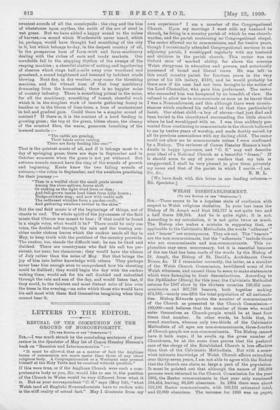LETTERS TO THE EDITOR.
REFUSAL OF THE COMMUNION ON THE GROUND OF NONCONFORMITY.'
, [TO TII1 EDITOR OF TIll " SFROTAT011.1 &L.-7/, was much struck by the concluding sentences of your
review in the Spectator of May 1st of Canon Hensley Henson's book on "Reunion and Intercommun ion " :—
" It must be allowed that as a matter of fact the Anglican terms of communion are much easier than those of any other religious body. A Congregationalist or a Wesleyan may present himself at the Holy Table and be received without question."
If this were true, or if the Anglican Church were such it com- prehensive body as you, Sir, would like to see it, the position of the Church in Wales would be very different from what it is. But as your correspondent "C. S." says (May 1st), "what Welsh (and all English) Nonconformists have to reckon with is the stiff reality of actual fact." May I illustrate from my own experience ? I am a member of the Congregational Church. Upon my marriage I went with my husband to church, be living in a country parish of which he was church- warden, and the parish containing no Congregational chapel. The rector allowed me to communicate, and for twelve years, though I occasionally attended Congregational services in an adjoining parish, I worshipped regularly with my husband and children in the parish church. This rector was an Oxford man of marked ability, far above the average Welsh clergyman in education and powers, and notoriomily possessed of broad and liberal views. He was left in this small country parish for fourteen years in the very prime of his life (salary, £110), and he would probably be there now if his case had not been brought to the notice of the Lord Chancellor, who gave him preferment. The rector who succeeded him was hampered by no breadth of view. He refused to allow me to communicate as soon as he learnt that I was a Nonconformist, and this although there were circum- stances which rendered his refusal at that time particularly harsh. Our eldest child—a boy of eleven—had just died and been buried in the churchyard surrounding the little church where he had worshipped with us. I was thus suddenly pre- vented from continuing to communicate in the church hallowed to me by twelve years of worship, and made doubly sacred:by all its precious associations with my darling child. The rector could not allow me to communicate unless I were confirmed by a Bishop. The reviewer of Canon Hensley Henson's book dwells in happy ignorance, and "C. S." may well describe your ideal of a National Church as a beautiful "dream." If it should seem to any of your readers that my tale is exaggerated, I shall be very pleased to give them privately my name and that of the parish in which I reside.—I am [We have dealt with this letter in our leading columns,— ED. Spectator.]










































 Previous page
Previous page